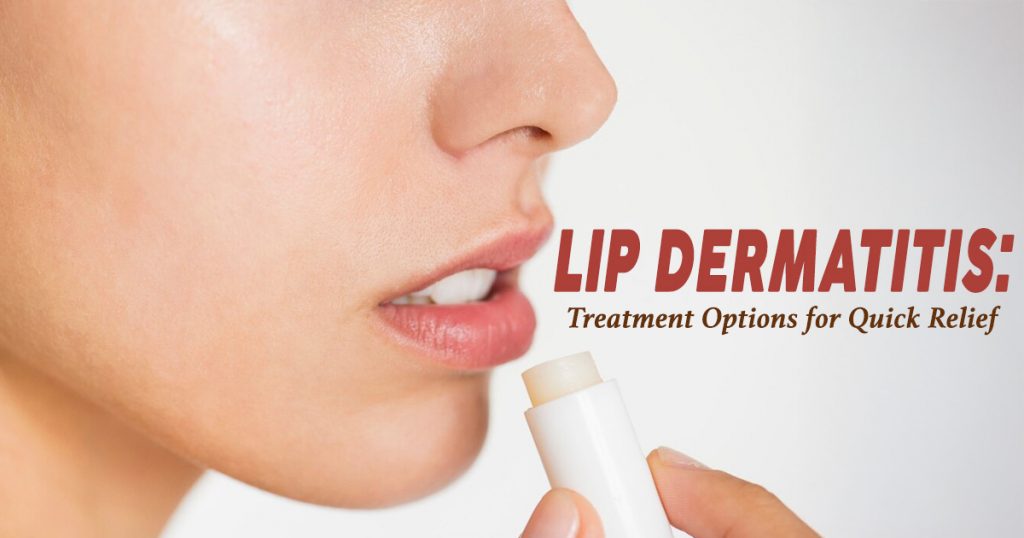Lip dermatitis, also known as lip eczema, can cause discomfort due to dryness, cracking, and irritation. It may develop due to various reasons. Although it can be persistent, several quick remedies can help soothe symptoms and prevent flare-ups.
What Causes Lip Dermatitis?
Several factors contribute to lip dermatitis, including:
- Allergic reactions: Certain foods, medications, or personal care products may trigger a reaction.
- Irritants: Lipsticks, flavored lip balms, toothpaste, and mouthwash may contain harsh chemicals.
- Excessive lip licking: Constant licking removes natural oils and leads to lip licker’s dermatitis.
- Environmental conditions: Exposure to extreme weather can make lips dry and more prone to irritation.
- Skin conditions: People with eczema or atopic dermatitis often experience dermatitis on their lips as well.
Common Symptoms
Lip dermatitis can cause:
- Dryness and flaking
- Redness and inflammation
- Itching or burning sensations
- Cracked or bleeding lips
These symptoms may come and go, but effective treatment can help manage discomfort.
Quick Remedies for Lip Dermatitis
1. Moisturize with Petroleum Jelly
A simple and effective way to treat dermatitis on lips is applying petroleum jelly. It locks in moisture and creates a protective barrier. Hypoallergenic and fragrance-free lip balms can also help keep lips hydrated.
2. Apply Hydrocortisone Ointment
For mild irritation, lip dermatitis treatment often includes over-the-counter 1% hydrocortisone cream. Cooling it in the refrigerator before application can provide extra relief.
3. Use a Cold Compress
A cool, damp cloth placed on the lips for 15 to 30 minutes can reduce inflammation and itching. This method is especially useful when dealing with severe dryness or redness.
4. Try an Oatmeal Soak
Finely ground oatmeal, known as colloidal oatmeal, can soothe irritated skin. Mixing it into a warm bath and soaking the affected area can relieve discomfort.
5. Take a Dilute Vinegar Bath
A vinegar bath may help reduce bacterial buildup and irritation. Adding one cup of vinegar to a tub of warm water can soothe inflamed lips and prevent infections.
6. Avoid Lip Licking and Biting
People struggling with how to get rid of lip licker’s dermatitis need to break the habit of licking, biting, or sucking their lips. Using a protective balm or petroleum jelly can help reduce the urge.
Medical Treatments for Persistent Lip Dermatitis
Topical Prescription Creams
For severe cases, doctors may prescribe steroid ointments or immune-modulating creams to reduce inflammation and irritation. These treatments help prevent the immune system from overreacting to allergens.
Light Therapy (Phototherapy)
Controlled exposure to natural or artificial light can help manage dermatitis on lips treatment when other remedies are not effective.
Oral or Injectable Medications
For extreme cases, doctors may recommend oral corticosteroids or an injectable biologic such as dupilumab. These treatments target inflammation at a deeper level.
Lifestyle Changes for Preventing Lip Dermatitis
1. Use Gentle, Fragrance-Free Products
Switching to fragrance-free lip balms, toothpaste, and cosmetics helps reduce irritation. Alcohol-free mouthwash is also a better choice for sensitive lips.
2. Stay Hydrated
Drinking plenty of water prevents dryness and improves skin elasticity, making lips less prone to cracking.
3. Protect Lips from Extreme Weather
Cold, dry air can worsen lip dermatitis. Using a scarf during winter or applying a protective lip balm with SPF in sunny weather helps prevent irritation.
4. Avoid Spicy and Salty Foods
Highly seasoned foods can worsen lip irritation. Sticking to mild foods during a flare-up can speed up healing.
5. Reduce Stress Levels
Stress can trigger certain skin conditions, including lip dermatitis. Engaging in relaxation techniques like deep breathing or meditation can help prevent flare-ups.
When to See a Doctor
Most cases of lip dermatitis respond well to home remedies, but some situations require professional medical care. If symptoms worsen or fail to improve, a doctor can determine the underlying cause and provide appropriate treatment.
Signs You Need Medical Attention
Seek medical help if you experience:
- Severe cracking, bleeding, or oozing: Open wounds increase the risk of infection and may require prescription treatments.
- Persistent symptoms despite treatment: If home remedies and over-the-counter treatments do not improve the condition, a stronger intervention may be necessary.
- Swelling around the lips, face, or eyes: This could indicate an allergic reaction or infection that needs medical evaluation.
- Painful or burning sensations: Intense discomfort may signal an underlying issue that requires professional care.
- Blisters or sores on the lips: This may suggest an infection, such as herpes simplex virus, which requires specific treatment.
What to Expect at the Doctor’s Office
A healthcare provider will examine your lips and may ask about your medical history, skincare routine, and potential allergen exposure. If necessary, they might perform tests such as:
- Patch testing to identify allergic reactions.
- Blood or urine tests to rule out infections.
- Biopsy in rare cases to check for other skin conditions.
Based on the diagnosis, a doctor may recommend a personalized lip dermatitis treatment plan, which could include prescription creams, antihistamines, or immune-modulating medications. Seeking timely medical care helps prevent complications and ensures faster healing.
Say Goodbye to Lip Discomfort
Dealing with dermatitis on the lips can be frustrating, but the right approach can provide relief. Moisturizing regularly, avoiding irritants, and breaking habits like lip-licking can prevent flare-ups.
If symptoms persist, medical treatments can offer more long-term solutions. Taking proactive steps ensures lips stay healthy, comfortable, and irritation-free.
